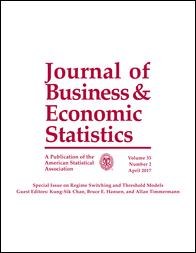
Bloemen, H. (2019). Collective Labour Supply, Taxes, and Intrahousehold Allocation: An Empirical Approach Journal of Business and Economic Statistics, 37(3):471--483.
-
Affiliated author
-
Publication year2019
-
JournalJournal of Business and Economic Statistics
Most empirical studies of the impact of labour income taxation on the labour supply behaviour of households use a unitary modelling approach. In this paper we empirically analyze income taxation and the choice of working hours by combining the collective approach for household behaviour and the discrete hours choice framework with fixed costs of work. We identify the sharing rule parameters with data on working hours of both the husband and the wife within a couple. Parameter estimates are used to evaluate various model outcomes, like the wage elasticities of labour supply and the impacts of wage changes on the intrahousehold allocation of income. We also simulate the consequences of a policy change in the tax system.